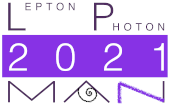Speaker
Description
We propose a new approach to explore the neutral-current non-standard neutrino interactions (NSI) in atmospheric neutrino experiments using oscillation dips and valleys in reconstructed muon observables, at a detector like ICAL that can identify the muon charge. We focus on the flavor-changing NSI parameter $\varepsilon_{\mu\tau}$, which has the maximum impact on the muon survival probability in these experiments. We show that non-zero $\varepsilon_{\mu\tau}$ shifts the oscillation dip locations in $L/E$ distributions of the up/down event ratios of reconstructed $\mu^-$ and $\mu^+$ in opposite directions. We introduce a new variable $\Delta d$ representing the difference of dip locations in $\mu^-$ and $\mu^+$, which is sensitive to the magnitude as well as the sign of $\varepsilon_{\mu\tau}$, and is independent of the value of $\Delta m^2_{32}$. We further note that the oscillation valley in the ($E$, $\cos \theta$) plane of the reconstructed muon observables bends in the presence of NSI, its curvature having opposite signs for $\mu^-$ and $\mu^+$. We demonstrate the identification of NSI with this curvature, which is feasible for detectors like ICAL having excellent muon energy and direction resolutions. We illustrate how the measurement of contrast in the curvatures of valleys in $\mu^-$ and $\mu^+$ can be used to estimate $\varepsilon_{\mu\tau}$. Using these proposed oscillation dip and valley measurements, the achievable precision on $|\varepsilon_{\mu\tau}|$ at 90% C.L. is about 2% with 500 kt$\cdot$yr exposure. The effects of statistical fluctuations, systematic errors, and uncertainties in oscillation parameters have been incorporated using multiple sets of simulated data. Our method would provide a direct and robust measurement of $\varepsilon_{\mu\tau}$ in the multi-GeV energy range.
